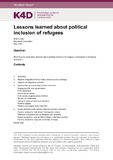Lessons Learned about Political Inclusion of Refugees
Abstract
Most refugees and other migrants have limited opportunities to participate in politics to inform and influence the policies that affect them daily; they have limited voting rights and generally lack effective alternative forms of representation such as consultative bodies (Solano & Huddleston, 2020a, p. 33). Political participation is ‘absent (or almost absent) from integration strategies’ in Eastern European countries, while refugees and other migrants in Western Europe do enjoy significant local voting rights, stronger consultative bodies, more funding for immigrant organisations and greater support from mainstream organisations (Solano & Huddleston, 2020a, p. 33).This rapid review seeks to find out what lessons have been learned about political inclusion of refugees, particularly in European countries.In general, there appears to be limited evidence about the effectiveness of attempts to support the political participation of migrants/refugees. ‘The engagement of refugees and asylum-seekers in the political activities of their host countries is highly understudied’ (Jacobi, 2021, p. 3) and ‘the effects that integration policies have on immigrants’ representation remains an under-explored field’ (Petrarca, 2015, p. 9). The evidence that is available often comes from sources that cover the entire population or ethnic minorities without specifically targeting refugees or migrants, are biased towards samples of immigrants who are long-established in the host country and may not be representative of immigrant populations, or focus only on voting behaviour and neglect other forms of political participation (Bilodeau, 2016, pp. 30–31). Statistical data on refugees and integration policy areas and indicators is often weak or absent (Hopkins, 2013, pp. 9, 28–32, 60). Data may not distinguish clearly among refugees and other types of migrants by immigration status, origin country, or length of stay in the host country; may not allow correlating data collected during different time periods with policies in place during those periods and preceding periods; and may fail to collect a range of relevant migrant-specific social and demographic characteristics (Bilgili et al., 2015, pp. 22–23; Hopkins, 2013, p. 28).
Citation
Lucas, B. (2022). Lessons learned about political inclusion of refugees. K4D Helpdesk Report 1157. Institute of Development Studies. DOI: 10.19088/K4D.2022.114DOI
10.19088/K4D.2022.114Is part of series
K4D Helpdesk;1157Rights holder
© Crown copyright 2022Sponsor
Foreign, Commonwealth and Development Office (FCDO)Collections
- K4D [937]

